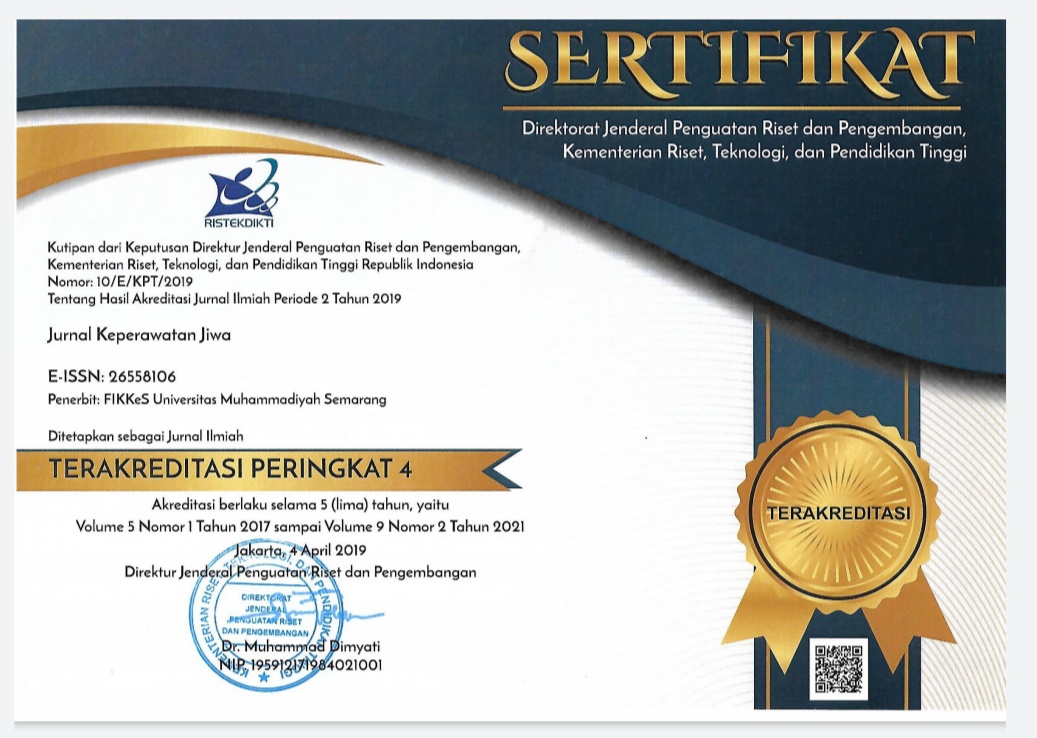Intervensi Resiliensi Menurunkan Tingkat Stres Pasien Komorbid di Masa Pandemi COVID 19
(1) Program Studi Keperawatan Bogor, Poltekkes Kemenkes Bandung
(2) Program Studi Keperawatan Bogor, Poltekkes Kemenkes Bandung
(3) Program Studi Keperawatan Bogor, Poltekkes Kemenkes Bandung
(4) Program Studi Sarejana Keperawatan dan Profesi Ners, Sekolah Tinggi Ilmu Kesehatan Kendal
(*) Corresponding Author
Abstract
Pandemi COVID-19 berdampak serius pada individu di seluruh dunia. Pada kondisi ini berbagai masalah psikologis muncul salah satunya adalah stres yang berdampak terhadap penurunan aktifitas fisik ,fungsi tubuh , persepsi tentang kesehatan dan kualitas hidup yang yang buruk, resiko kematian. Stres karena pandemi COVID 19 sangat dirasakan terutama pada pasien komorbid. Tujuan penelitian ini menganalisis pengaruh intervensi resiliensi terhadap tingkat stres pasien komorbid di masa pandemi COVID-19. Desain penelitian ini adalah ”Quasi experimental pre-post test with control group” dengan intervensi resiliensi . Responden penelitian ini pasien hipertensi dan diabetes mellitus yang mengalami stres berdasarkan perceived stres scale 10 . Penelitian ini telah dilakukan di provinsi Jawa barat dan Jawa tengah. Jumlah responden sebanyak 90 orang. Menggunakan purposive sampling. Analisis data yang digunakan independent samples t test dan paired samples t test. Hasil penelitian didapatkan adanya penurunan tingkat stres pasien komorbid setelah intervensi resiliensi (p-value= 0,004). Rekomendasi penelitian ini diharapkan pentingnya intervensi psikososial untuk mengatasi masalah kesehatan jiwa pasien komorbid.
Keywords
Full Text:
PDFReferences
American Psychological Association. (2012). Building your resilience. In American Psychological Association.
Anggara, F. H. D., & Prayitno, N. (2013). Faktor-Faktor Yang Berhubungan Dengan Tekanan Darah di Puskesmas Telaga Murni Cikarang Barat Tahun 2012. Jurnal Ilmiah Kesehatan, 5(1). https://doi.org/10.1002/9781444324808.ch36
Biggs, A., Brough, P., & Drummond, S. (2017). Lazarus and Folkman’s Psychological Stres and Coping Theory. The Handbook of Stres and Health. In The Handbook of Stres and Health.
Brooks, S. K., Webster, R. K., Smith, L. E., Woodland, L., Wessely, S., Greenberg, N., & Rubin, G. J. (2020). The psychological impact of quarantine and how to reduce it: rapid review of the evidence. In The Lancet (Vol. 395, Issue 10227). https://doi.org/10.1016/S0140-6736(20)30460-8
Cohen, S., Kamarck, T., Mermelstein, R. (1983). A global measure of perceived stres. Journal of Health and Social Behavior. Journal of Health and Social Behavior, 24(4).
Connor, K. M., & Davidson, J. R. T. (2003). Development of a new Resilience scale: The Connor-Davidson Resilience scale (CD-RISC). Depression and Anxiety, 18(2). https://doi.org/10.1002/da.10113
COVID-19, S. T. P. (2021). Daftar Vaksin COVID-19 Yang Digunakan di Indonesia - Masyarakat Umum | COVID19.go.id. Satuan Tugas Penganan COVID-19.
Gangopadhyaya, A., & Garrett, A. B. (2020). Unemployment, Health Insurance, and the COVID-19 Recession. SSRN Electronic Journal. https://doi.org/ 10.2139/ ssrn.3568489
Grotberg, E. H. (2007). I have I am I can. NHSA Dialog, 10(1). https://doi.org/ 10.1080/15240750701301563
Hidayat, D., Jumaini, & Hasneli Yesi. (2021). Gambaran Tingkat Stres Penderita Diabetes Melitus Tipe II Selama Pandemi COVID-19. Angewandte Chemie International Edition, 6(11), 951–952., 8(2).
Kemenkes RI. (2020). Kementerian Kesehatan RI “13,2 Persen Pasien COVID-19 yang Meninggal Memiliki Penyakit Hipertensi.” 13 Oktober 2020.
Khedr, E. M., Daef, E., Mohamed-Hussein, A., Mostafa, E. F., Zein, M., Hassany, S. M., Galal, H., Hassan, S. A., Galal, I., Zarzour, A. A., Hetta, H. F., Hassan, H. M., Amin, M. T., & Hashem, M. K. (2020). Impact of comorbidities on COVID-19 outcome. MedRxiv : The Preprint Server for Health Sciences. https://doi.org/ 10.1101/2020.11.28.20240267
Meister, R. E., Princip, M., Schnyder, U., Barth, J., Znoj, H., Schmid, J. P., Wittmann, L., & Von Känel, R. (2016). Association of trait resilience with peritraumatic and posttraumatic stres in patients with myocardial infarction. Psychosomatic Medicine, 78(3). https://doi.org/10.1097/PSY.0000000000000278
Nikopoulou, V. A., Gliatas, I., Blekas, A., Parlapani, E., Holeva, V., Tsipropoulou, V., Karamouzi, P., Godosidis, A., & Diakogiannis, I. (2022). Uncertainty, Stres, and Resilience During the COVID-19 Pandemic in Greece. Journal of Nervous and Mental Disease, 210(4). https://doi.org/10.1097/NMD.0000000000001491
Sarki, A. M., Nduka, C. U., Stranges, S., Kandala, N. B., & Uthman, O. A. (2015). Prevalence of hypertension in low- and middle-income countries: A systematic review and meta-analysis. Medicine (United States), 94(50). https://doi.org/ 10.1097/MD.0000000000001959
Schwartz, M. R., & Oppold, P. (2021). The Impact of Assistive Technologies on Quality of Life and Psychosocial Well-Being. In Research Anthology on Physical and Intellectual Disabilities in an Inclusive Society. https://doi.org/10.4018/978-1-6684-3542-7.ch038
Smith, B. W., Dalen, J., Wiggins, K., Tooley, E., Christopher, P., & Bernard, J. (2008). The brief resilience scale: Assessing the ability to bounce back. International Journal of Behavioral Medicine, 15(3). https://doi.org/10.1080/10705500802222972
Widjaya, N., Anwar, F., Laura Sabrina, R., Rizki Puspadewi, R., & Wijayanti, E. (2019). Hubungan Usia Dengan Kejadian Hipertensi di Kecamatan Kresek dan Tegal Angus, Kabupaten Tangerang. YARSI Medical Journal, 26(3). https://doi.org/ 10.33476/jky.v26i3.756
Article Metrics
Abstract view : 514 timesPDF - 128 times
DOI: https://doi.org/10.26714/jkj.10.2.2022.411-420
Refbacks
- There are currently no refbacks.

This work is licensed under a Creative Commons Attribution 4.0 International License.
PPNI Univ. Muhammadiyah Semarang
Jl. Kedungmundu Raya No. 18 Semarang Gedung NRC University of Muhammadiyah Semarang
Phone: 02476740287
Fax: 02476740287
Email: [email protected]
This work is licensed under a Creative Commons Attribution 4.0 International License.


